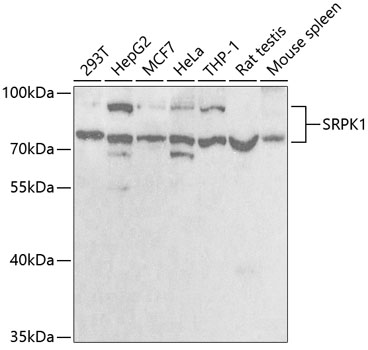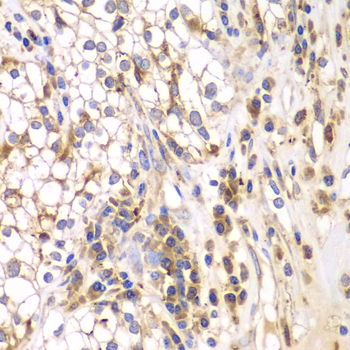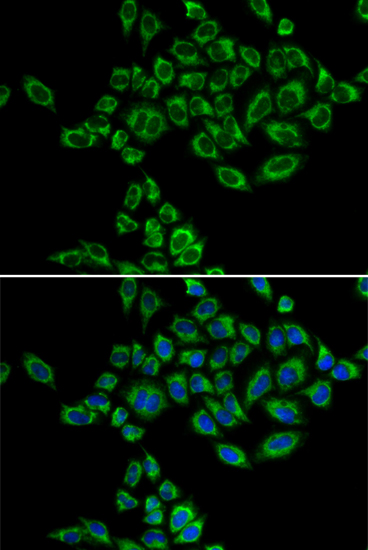Epigenetics & Nuclear Signaling Antibodies 2
Anti-SRPK1 Antibody (CAB5854)
- SKU:
- CAB5854
- Product Type:
- Antibody
- Reactivity:
- Human
- Reactivity:
- Mouse
- Reactivity:
- Rat
- Host Species:
- Rabbit
- Isotype:
- IgG
- Antibody Type:
- Polyclonal Antibody
- Research Area:
- Epigenetics and Nuclear Signaling
Description
| Antibody Name: | Anti-SRPK1 Antibody |
| Antibody SKU: | CAB5854 |
| Antibody Size: | 20uL, 50uL, 100uL |
| Application: | WB IHC IF |
| Reactivity: | Human, Mouse, Rat |
| Host Species: | Rabbit |
| Immunogen: | Recombinant fusion protein containing a sequence corresponding to amino acids 290-480 of human SRPK1 (NP_003128.3). |
| Application: | WB IHC IF |
| Recommended Dilution: | WB 1:500 - 1:2000 IHC 1:50 - 1:200 IF 1:10 - 1:100 |
| Reactivity: | Human, Mouse, Rat |
| Positive Samples: | 293T, HepG2, MCF7, HeLa, THP-1, Rat testis, Mouse spleen |
| Immunogen: | Recombinant fusion protein containing a sequence corresponding to amino acids 290-480 of human SRPK1 (NP_003128.3). |
| Purification Method: | Affinity purification |
| Storage Buffer: | Store at -20'C. Avoid freeze / thaw cycles. Buffer: PBS with 0.02% sodium azide, 50% glycerol, pH7.3. |
| Isotype: | IgG |
| Sequence: | EEME KESG PGQK RPNK QEES ESPV ERPL KENP PNKM TQEK LEES STIG QDQT LMER DTEG GAAE INCN GVIE VINY TQNS NNET LRHK EDLH NAND CDVQ NLNQ ESSF LSSQ NGDS STSQ ETDS CTPI TSEV SDTM VCQS SSTV GQSF SEQH ISQL QESI RAEI PCED EQEQ EHNG PLDN KGKS TAGN FLV |
| Gene ID: | 6732 |
| Uniprot: | Q96SB4 |
| Cellular Location: | Cytoplasm, Microsome, Microsome, Nucleus, Nucleus matrix |
| Calculated MW: | 72kDa/74kDa/92kDa |
| Observed MW: | 74kDa/80kDa |
| Synonyms: | SRPK1, SFRSK1 |
| Background: | This gene encodes a serine/arginine protein kinase specific for the SR (serine/arginine-rich domain) family of splicing factors. The protein localizes to the nucleus and the cytoplasm. It is thought to play a role in regulation of both constitutive and alternative splicing by regulating intracellular localization of splicing factors. Alternative splicing of this gene results in multiple transcript variants. Additional alternatively spliced transcript variants have been described for this gene, but their full length nature have not been determined. |
| UniProt Protein Function: | Serine/arginine-rich protein-specific kinase which specifically phosphorylates its substrates at serine residues located in regions rich in arginine/serine dipeptides, known as RS domains and is involved in the phosphorylation of SR splicing factors and the regulation of splicing. Plays a central role in the regulatory network for splicing, controlling the intranuclear distribution of splicing factors in interphase cells and the reorganization of nuclear speckles during mitosis. Can influence additional steps of mRNA maturation, as well as other cellular activities, such as chromatin reorganization in somatic and sperm cells and cell cycle progression. Isoform 2 phosphorylates SFRS2, ZRSR2, LBR and PRM1. Isoform 2 phosphorylates SRSF1 using a directional (C-terminal to N-terminal) and a dual-track mechanism incorporating both processive phosphorylation (in which the kinase stays attached to the substrate after each round of phosphorylation) and distributive phosphorylation steps (in which the kinase and substrate dissociate after each phosphorylation event). The RS domain of SRSF1 binds first to a docking groove in the large lobe of the kinase domain of SRPK1. This induces certain structural changes in SRPK1 and/or RRM2 domain of SRSF1, allowing RRM2 to bind the kinase and initiate phosphorylation. The cycles continue for several phosphorylation steps in a processive manner (steps 1-8) until the last few phosphorylation steps (approximately steps 9-12). During that time, a mechanical stress induces the unfolding of the beta-4 motif in RRM2, which then docks at the docking groove of SRPK1. This also signals RRM2 to begin to dissociate, which facilitates SRSF1 dissociation after phosphorylation is completed. Isoform 2 can mediate hepatitis B virus (HBV) core protein phosphorylation. It plays a negative role in the regulation of HBV replication through a mechanism not involving the phosphorylation of the core protein but by reducing the packaging efficiency of the pregenomic RNA (pgRNA) without affecting the formation of the viral core particles. Isoform 1 and isoform 2 can induce splicing of exon 10 in MAPT/TAU. The ratio of isoform 1/isoform 2 plays a decisive role in determining cell fate in K-562 leukaemic cell line: isoform 2 favors proliferation where as isoform 1 favors differentiation. |
| NCBI Summary: | This gene encodes a serine/arginine protein kinase specific for the SR (serine/arginine-rich domain) family of splicing factors. The protein localizes to the nucleus and the cytoplasm. It is thought to play a role in regulation of both constitutive and alternative splicing by regulating intracellular localization of splicing factors. Alternative splicing of this gene results in multiple transcript variants. Additional alternatively spliced transcript variants have been described for this gene, but their full length nature have not been determined.[provided by RefSeq, Jul 2010] |
| UniProt Code: | Q96SB4 |
| NCBI GenInfo Identifier: | 209572680 |
| NCBI Gene ID: | 6732 |
| NCBI Accession: | Q96SB4.2 |
| UniProt Secondary Accession: | Q96SB4,Q12890, Q5R364, Q5R365, Q8IY12, B4DS61, |
| UniProt Related Accession: | Q96SB4 |
| Molecular Weight: | 72,383 Da |
| NCBI Full Name: | SRSF protein kinase 1 |
| NCBI Synonym Full Names: | SRSF protein kinase 1 |
| NCBI Official Symbol: | SRPK1 |
| NCBI Official Synonym Symbols: | SFRSK1 |
| NCBI Protein Information: | SRSF protein kinase 1 |
| UniProt Protein Name: | SRSF protein kinase 1 |
| UniProt Synonym Protein Names: | SFRS protein kinase 1; Serine/arginine-rich protein-specific kinase 1; SR-protein-specific kinase 1 |
| Protein Family: | SRSF protein kinase |
| UniProt Gene Name: | SRPK1 |
| UniProt Entry Name: | SRPK1_HUMAN |
View AllClose









